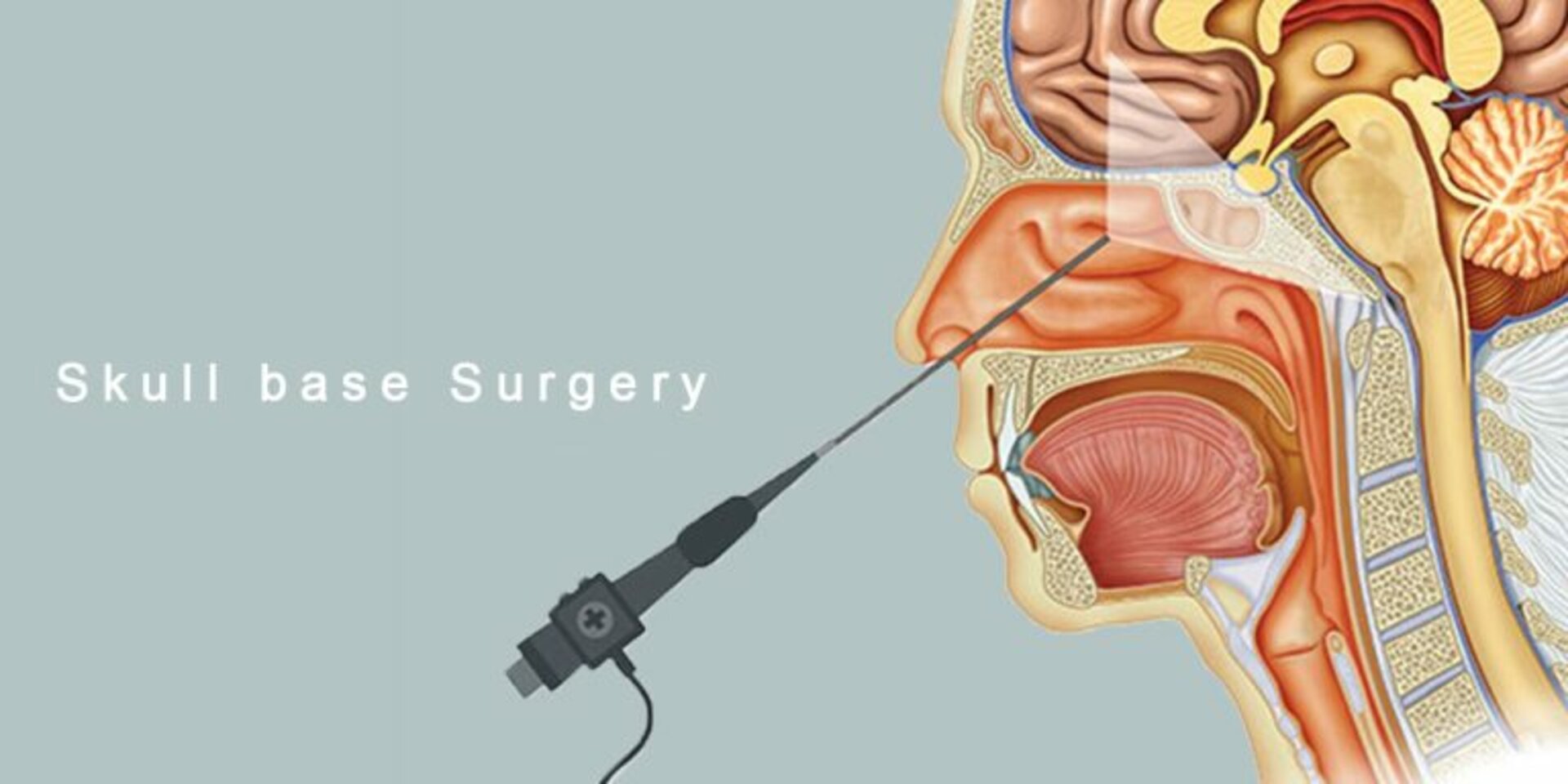Skull Base Surgery - Dr. Palak Jaiswal
WHAT IS SKULL BASE SURGERY?
Skull base surgery is surgery that is done to remove a tumor or other growth at the base, or bottom, of the skull. Skull base surgery may be done to remove both noncancerous and cancerous growths, and abnormalities on the underside of the brain, the skull base, or the top few vertebrae of the spinal column. Because this is such a difficult area to see and reach, skull base surgery may be done by a minimally invasive endoscopic procedure.

Types of skull base surgery:
Skull base surgery can be done in two main ways.
- Endoscopic or minimally invasive skull base surgery: This type of surgery often doesn’t require a large cut (incision). A surgeon may make a small opening (keyhole) inside the nose.
- Traditional or open skull base surgery: This type of surgery may require incisions in the facial area and in the skull. Parts of bone may need to be removed so that the growth can be reached and removed. An operating room microscope is often used for this type of surgery.
What is skull base surgery used for?
These are some of the growths and conditions that may be treated by skull base surgery:
- Cysts that develop from birth
- Growths caused by infections
- Pituitary tumors
- Meningiomas, noncancer tumors that grow from the tissue that covers the brain and lies between the brain and skull (the meninges)
- Chordomas, a slow-growing bone tumor most often found at the base of the skull
- Trigeminal neuralgia, an intense pain on one side of the face
- Craniopharyngiomas, are growths that occur near the pituitary gland
- Craniosynostosis, a condition in which the bones of an infant’s skull close too early. This causes problems with brain growth and the shape of the skull.
- Cerebrospinal fluid fistulas
- A cerebral aneurysm is a weak, often bulging area in a blood vessel in the brain
- Arteriovenous malformations, arteries, and veins that are abnormally connected to one another
Symptoms
Symptoms will depend on the size, type, and location of the growth or abnormality, and may include:
- Headache
- Peripheral field vision loss
- Vomiting
- Personality changes, confusion
- Stunted growth or delayed puberty in children
- Fatigue
- Hyperphagia and weight gain
- Adrenal insufficiency
- Fatigue
- Low blood pressure
Causes
- Developmental delays
- Cognitive impairment
- Blindness Seizures
Headaches
Investigation
The diagnosis of growths or abnormalities that may require skull base surgery is based on your symptoms and a physical exam. Because this area can’t be seen directly, these exams and imaging studies are important parts of the diagnosis:
Brain imaging studies: Special tests to create pictures of the skull. This helps your medical team see a growth or abnormality. These tests include MRI, MRA (magnetic resonance angiogram), PET (positron emission tomography), and CT scans.
Biopsy: A small piece of growth in the skull base may be taken out and looked at under a microscope. A biopsy may be done using an endoscope placed through the nose and sinuses. Biopsies may also be done by fine need aspiration or excisional biopsy.
Other tests: Your balance, cranial nerves, muscle activity, vision, hearing, and hormonal levels may all be checked. Studies or scans of other areas and body systems may also be checked.
Treatment
- Chemotherapy. These are drugs used to treat growths caused by cancer.
- Radiation therapy. X-ray treatment may be used to control growth in the skull base that can’t be completely removed by surgery.
- Gamma knife. This is a special type of radiation therapy that uses precise X-ray beams to target growth in the skull base.
- Proton beam therapy. This is another type of radiation therapy designed to have greater accuracy and dosing for tumors.
- Particle therapy. This is the newest form of radiotherapy. It uses high-energy particles with fewer side effects. Carbon-ion radiotherapy is a form of particle therapy.
- Endocrine therapy. This uses medicines to increase or decrease certain hormones.
- Immunotherapy. These medicines stimulate the immune system to target and remove tumor cells.
Precaution after skull base surgery:
After skull base surgery, you will be closely cared for by your medical team. Their goal is to allow you to return to normal activities of daily living. Some people need continued therapy. This may include radiotherapy, radiosurgery, and proton beam therapy. Many will need repeated imaging to make sure that a growth is not coming back over time. This type of surgery can be very stressful. So, it’s also important to get support from friends and family. Your treatment team can also provide mental health and support group resources for you and your family.
Read More-
Neurotrauma Surgery - Dr. Palak Jaiswal
Pediatric neurosurgery -Dr. Palak Jaiswal